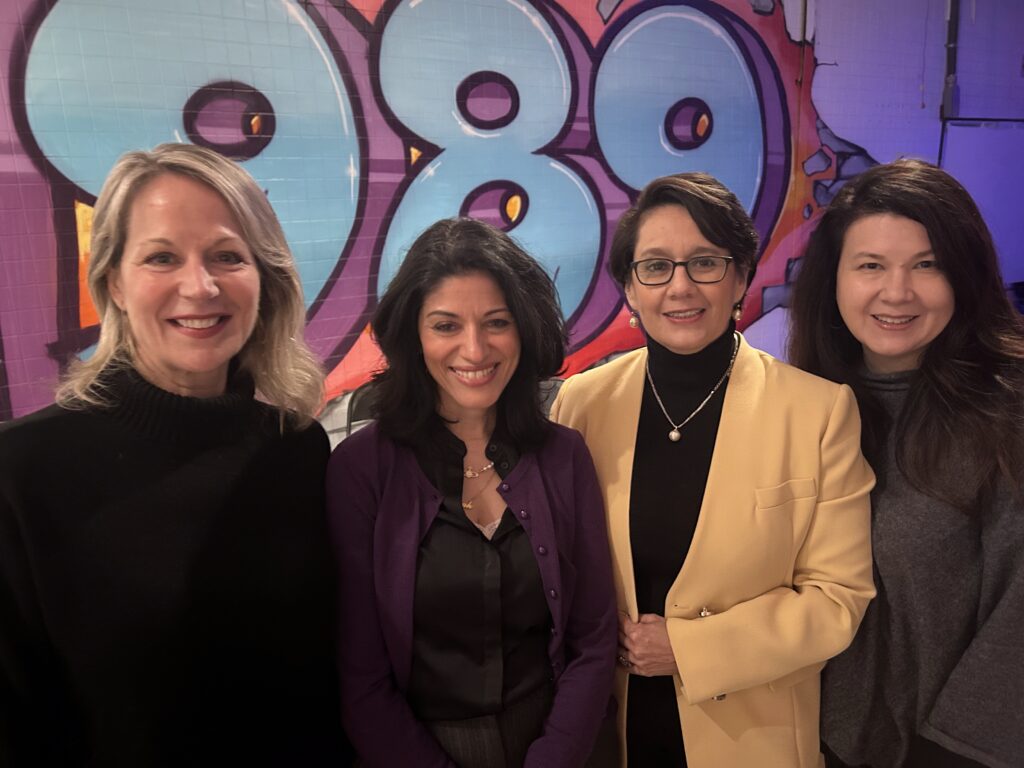New Folger Director: ‘Theater Is Political’
By • December 16, 2024 0 1246

In 2015, Sunny Sumter of the DC Jazz Festival sang “Better Than Anything” for Cultural Leadership Breakfast attendees. Three years later, Chamber Dance Project’s Diane Coburn Bruning demonstrated choreography on a few volunteers.
Last Thursday, Folger Shakespeare Library Director Farah Karim-Cooper — remarking, at the start of her talk, “I’ve been here for about six weeks now” — read a little Shakespeare.
It was from the prologue to “Henry V,” including the oft-quoted metaphors for the round Globe playhouse: “Can this cockpit hold/The vasty fields of France? Or may we cram/Within this wooden O the very casques/That did affright the air at Agincourt?” (Casques are soliders’ helmets; see “language barrier” below.)
Though she noted she wasn’t an actor, the Folger’s new director transfixed the 30-some attendees on Dec. 12 in Dupont Underground, a first-time venue for The Georgetowner’s eight-mornings-a-year (most years) series.
Dr. Karim-Cooper’s point? What she called “the fundamental paradox of theater”: that it uses artifice to arrive at the truth. When, in 1599, at the premiere of “Henry V,” the Chorus (a single character) told the playgoers at the Globe, “Think, when we talk of horses, that you see them,” he was prompting them to use their imaginations and “cognitive capacities.”
Discomfort — hundreds stood, exposed to the sky — was part of early modern theater, which was “less passive” than today’s, she explained. While she didn’t call for the return of standing room, she said she intends to build on the work of her predecessor, Dr. Michael Witmore (who spoke at a Georgetowner breakfast in 2019), to “leverage the largest Shakespeare collection in the world” to “reinvigorate the conversation of ideas.”
Born in Karachi, Pakistan, and raised in Houston, Dr. Karim-Cooper got her B.A. at California State University, Fullerton — where “an amazing professor” (Dr. Kay Stanton) inspired her to “want to tell people everything there is to know about Shakespeare,” while having her bag match her shoes, she joked.
Relocating to England, she earned her Ph.D. at Royal Holloway, University of London, and worked her way up to director of education, a position also responsible for research and higher education, at Shakespeare’s Globe, the reconstruction that opened in 1997 near the theater’s original site on the south bank of the Thames.
When, in addition to her role at Shakespeare’s Globe, she was hired by King’s College London as professor of Shakespeare studies, she became at that time the sole professor of color in the U.K.
In recent years — while writing essays and books about Shakespeare, notably her third book, 2023’s “The Great White Bard: How to Love Shakespeare While Talking About Race,” and taking on various editing projects — she has focused on audience development at Shakespeare’s Globe and creating “a pipeline to scholars of color.” In 2018, she founded the Globe’s Shakespeare and Race Festival.
Shakespeare, she stated, is a “contested space,” often thought of as “the property of an elite group.” Her examination of his work through the lens of race was called “an over-politicization of the Bard.” (That was mild compared to the hate mail.) “But theater is political,” she told breakfast attendees. What’s more, the Folger “is, I’m afraid, going to be political from time to time.”
Regarding the relevance of race, during the period when Shakespeare was writing, “identity was formed through exchange with ‘the other,’” she said. “The Great White Bard” explores this, along with the use of racialized language, in “Antony and Cleopatra,” “The Merchant of Venice,” “Othello,” “The Tempest” and, her favorite Shakespeare play, “Titus Andronicus.”
Speaking of language, Dr. Karim-Cooper touched on the Elizabethan English “language barrier” in performing and teaching Shakespeare. She said that “every director” — whether it’s the late, legendary Peter Brook or for a production “in doublets and hose” — “will tweak the language,” and that, after students participate in Folger education programs, “the language is almost embedded in them.”
Hopefully, she said, the Folger Library, which reopened with garden entrances in June after a major expansion, will no longer elicit the casual comment: “Every time I walked by the Folger, I thought it was a mausoleum.” Asked where in D.C. she decided to live, Dr. Karim-Cooper responded that she is “settled in Capitol Hill, so I can walk to work.”
P.S. She said she would love to see Shakespeare performed in Dupont Underground.

